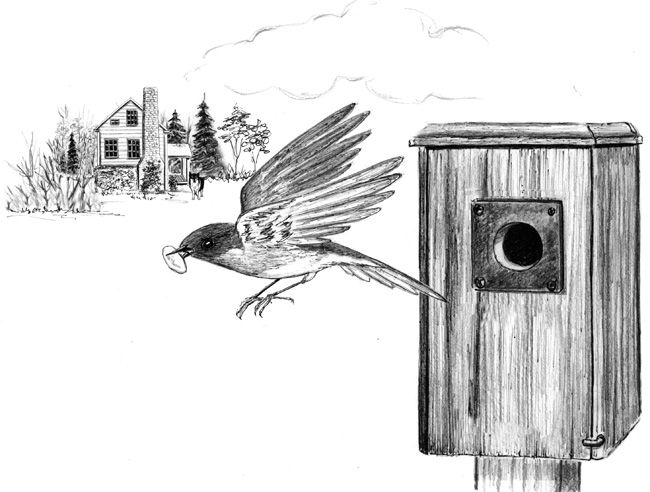
Dear Bird Folks,
We have a family of bluebirds nesting in our birdhouse. All day long we watch the parents carry food to their hungry babies. However, one thing has us puzzled. The adults enter the box with food, but when they leave they are carrying something white in their beaks and we have no clue what it is. Any idea?
– Rose, Eastham, MA
I’m jealous, Rose,
When I lived in Eastham I too had bluebirds nesting in my yard. Then my wife decided we needed to move to Orleans (probably to be closer to TJ Maxx) and we have never seen a single bluebird anywhere near our new yard…and we’ve been here for twenty years. In fact, very few of my Orleans customers report getting bluebirds in their birdhouses. Why? It could have something to do with habitat. Most of Eastham is naturally landscaped, which seems to be more appealing to the birds. Orleans, on the other hand, is infested with manicured lawns and pruned shrubbery, which are not the birds’ favorite things. Apparently, bluebirds prefer what Eastham has to offer and Orleans not so much. Unless, of course, the birds want a glass of good drinking water, then they come to Orleans. (Bluebirds read the newspaper.)
What you are witnessing is one of the true marvels of nature. Okay, maybe “marvel” is too strong a word, but it is really cool. The white things your bluebirds are carrying out of their nest box are “fecal sacs.” Yup, you read that right. As the name implies, fecal sacs are little packages of baby bird poop. And the birds carry them away in their mouths! (And you thought you had a bad job.)
Bluebirds are readily attracted to birdhouses, but in an effort to cut corners, most birdhouses don’t come equipped with indoor plumbing. And even if a birdhouse did have a bathroom, the baby birds couldn’t use it. Bluebirds are born naked, helpless and blind, so there is no way they could find their way down the hall, even if a nightlight was left on. But the little birds can’t simply poop in their nest. If they did their nest would quickly become disgusting, like a gas station restroom at the end of Memorial Day weekend. So, young birds have evolved to expel poop that is encased in tiny gelatinous sacs. These sacs are like organic Pampers, only they don’t cost outrageous prices and they don’t clog our landfills.
Like walking the dog after supper, a parent bird will feed its baby and then wait a few minutes for the youngster to turn around and pop out a totally bundled-up petite package of poop (say that three times fast). If the little bird is slow with the delivery, the adult will often peck at the….um…exit area, we’ll call it, to help stimulate things. And if that doesn’t do the trick, the parent will next hand the kid a magazine and wait things out.
These fecal sacs aren’t unique to bluebirds. Lots of songbirds subscribe to this waste management plan. Birds such as cardinals take things a step further. Instead of going through all the trouble of flying away with the sac, they simply stay in the nest and eat it. (Now, that’s what I call lazy.) As gross as this poop-eating habit sounds (and it does sound gross), there is actually a reason for it. For the first few days of their lives the digestive system of young birds isn’t well developed. Much of the food they ingest passes through them unprocessed, so the adults are simply taking advantage of this homegrown food source. (Hmm. I’m a big advocate of recycling, but even I’m not sure I want to sign up for this program.)
Removing fecal sacs not only keeps the nest site sanitary, but it also helps the nest stay hidden from other creatures. The sight and smell of whitewash would be an open invitation to hungry predators. Predator avoidance is so important that some birds, like grackles for example, go to extreme measures to hide their babies’ poop sacs. Instead of dropping the sacs in the woods, grackles often drop them into water. Historically, the birds have used running rivers and lakes to carry away the evidence. If rivers aren’t available, the birds will also drop the poop packs into people’s swimming pools and even onto tennis courts. That’s when my phone starts ringing.
The parents of House Finches do things a bit differently. Even though they’ve read all the literature about predator attraction, they don’t buy into it. After a few days of constant fecal sac removal, the adults grow tired of being on poop duty, so they totally stop dealing with it. If their babies want to have a clean nest, the nestlings have to take care of things themselves. With no help from their slacker parents, the young finches back up to the edge of the nest and deposit the gooey sacs along the rim, where they stay. By the time the little finches are old enough to fly, a thick wall of dried poop totally encircles their nest. And even though it looks disgusting, their parents don’t seem to mind one bit…no matter how much the neighbors complain.
Congratulations on your bluebird family, Rose. Lucky you. I would totally love to see some bluebirds in my area. Hey, could you do me a favor? When the baby birds finally leave the box, could you send them to Orleans? Please? I’d even make it worth your while. Let’s see, what could I give you? How about something from TJ Maxx? It wouldn’t be any trouble. My wife is headed there now.